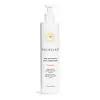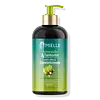What's inside
What's inside
 Key Ingredients
Key Ingredients

 Benefits
Benefits

 Concerns
Concerns

 Ingredients Side-by-side
Ingredients Side-by-side

Water
Skin ConditioningBehentrimonium Methosulfate
Cetearyl Alcohol
EmollientGlycerin
HumectantStearalkonium Chloride
PreservativeAloe Barbadensis Leaf Juice
Skin ConditioningCaprylic/Capric Triglyceride
MaskingButyrospermum Parkii Butter
Skin ConditioningSodium Benzoate
MaskingOryza Sativa Bran Oil
EmollientPersea Gratissima Oil
Skin ConditioningCocos Nucifera Oil
MaskingHydrolyzed Quinoa
Skin ConditioningHydrolyzed Rice Protein
Skin ConditioningCamellia Sinensis Leaf Extract
AntimicrobialWater, Behentrimonium Methosulfate, Cetearyl Alcohol, Glycerin, Stearalkonium Chloride, Aloe Barbadensis Leaf Juice, Caprylic/Capric Triglyceride, Butyrospermum Parkii Butter, Sodium Benzoate, Oryza Sativa Bran Oil, Persea Gratissima Oil, Cocos Nucifera Oil, Hydrolyzed Quinoa, Hydrolyzed Rice Protein, Camellia Sinensis Leaf Extract
Water
Skin ConditioningCetearyl Alcohol
EmollientOlea Europaea Fruit Oil
MaskingCocos Nucifera Oil
MaskingPrunus Amygdalus Dulcis Oil
Skin ConditioningCetrimonium Chloride
AntimicrobialCaprylic/Capric Triglyceride
MaskingBehentrimonium Methosulfate
Sesamum Indicum Seed Oil
EmollientPersea Gratissima Oil
Skin ConditioningBehentrimonium Chloride
PreservativeAloe Barbadensis Leaf Juice
Skin ConditioningCalophyllum Inophyllum Seed Oil
AntimicrobialButyrospermum Parkii Butter
Skin ConditioningCurcuma Longa Root Extract
MaskingPanthenol
Skin ConditioningCetearyl Olivate
Sorbitan Olivate
EmulsifyingPPG-3 Benzyl Ether Myristate
EmollientIsostearyl Isostearate
EmollientQuaternium-80
Phenoxyethanol
PreservativeBenzoic Acid
MaskingEthylhexylglycerin
Skin ConditioningGlycereth-2 Cocoate
EmulsifyingParfum
MaskingAnthocyanins
Cosmetic ColorantWater, Cetearyl Alcohol, Olea Europaea Fruit Oil, Cocos Nucifera Oil, Prunus Amygdalus Dulcis Oil, Cetrimonium Chloride, Caprylic/Capric Triglyceride, Behentrimonium Methosulfate, Sesamum Indicum Seed Oil, Persea Gratissima Oil, Behentrimonium Chloride, Aloe Barbadensis Leaf Juice, Calophyllum Inophyllum Seed Oil, Butyrospermum Parkii Butter, Curcuma Longa Root Extract, Panthenol, Cetearyl Olivate, Sorbitan Olivate, PPG-3 Benzyl Ether Myristate, Isostearyl Isostearate, Quaternium-80, Phenoxyethanol, Benzoic Acid, Ethylhexylglycerin, Glycereth-2 Cocoate, Parfum, Anthocyanins
Ingredients Explained
These ingredients are found in both products.
Ingredients higher up in an ingredient list are typically present in a larger amount.
Aloe Barbadensis Leaf Juice comes from leaves of the aloe plant. Aloe Barbadensis Leaf Juice is best known for helping to soothe sunburns. It is also anti-inflammatory, moisturizing, antiseptic, and can help heal wounds.
Aloe is packed with good stuff including Vitamins A, C, and E. These vitamins are antioxidants, which help fight free-radicals and the damage they may cause. Free-radicals are molecules that may damage your skin cells, such as pollution.
Aloe Barbadensis Leaf Juice also contains sugars. These sugars come in the form of monosaccharides and polysaccharides, folic acid, and choline. These sugars are able to help bind moisture to skin.
It also contains minerals such as calcium, 12 anthraquinones, fatty acids, amino acids, and Vitamin B12.
Learn more about Aloe Barbadensis Leaf JuiceBehentrimonium Methosulfate is an ammonium salt. It is mainly used to prevent static in haircare products as a surfactant.
Surfactants have differing ends: one side is hydrophilic while the other end is hydrophobic.
Surfactants also help your cleansers remove pollutants more easily from the skin.
Learn more about Behentrimonium MethosulfateThis ingredient is also known as shea butter. It is an effective skin hydrator and emollient.
Emollients help soothe and soften your skin. It does this by creating a protective film on your skin. This barrier helps trap moisture and keeps your skin hydrated. Emollients may be effective at treating dry or itchy skin.
Shea butter is rich in antioxidants. Antioxidants help fight free-radicals, or molecules that may harm the body. It is also full of fatty acids including stearic acid and linoleic acid. These acids help replenish the skin and keep skin moisturized.
While Shea Butter has an SPF rating of about 3-4, it is not a sunscreen replacement.
Shea butter may not be fungal acne safe. We recommend speaking with a professional if you have any concerns.
Learn more about Butyrospermum Parkii ButterThis ingredient is an emollient, solvent, and texture enhancer. It is considered a skin-softener by helping the skin prevent moisture loss.
It helps thicken a product's formula and makes it easier to spread by dissolving clumping compounds.
Caprylic Triglyceride is made by combining glycerin with coconut oil, forming a clear liquid.
While there is an assumption Caprylic Triglyceride can clog pores due to it being derived from coconut oil, there is no research supporting this.
Learn more about Caprylic/Capric TriglycerideCetearyl alcohol is a mixture of two fatty alcohols: cetyl alcohol and stearyl alcohol. It is mainly used as an emulsifier. Emulsifiers help prevent the separation of oils and products. Due to its composition, it can also be used to thicken a product or help create foam.
Cetearyl alcohol is an emollient. Emollients help soothe and hydrate the skin by trapping moisture.
Studies show Cetearyl alcohol is non-toxic and non-irritating. The FDA allows products labeled "alcohol-free" to have fatty alcohols.
This ingredient is usually derived from plant oils such as palm, vegetable, or coconut oils. There is debate on whether this ingredient will cause acne.
Due to the fatty acid base, this ingredient may not be Malassezia folliculitis safe.
Learn more about Cetearyl AlcoholCocos Nucifera Oil is obtained from the kernels of the coconut fruit. In other words, this is coconut oil.
Coconut Oil is rich in fatty acids with lauric acid making up the majority of these. It also contains linoleic acid. Due to this high fatty acid content, coconut oil helps trap moisture and soften skin.
Despite being antibacterial, coconut oil may not be great for acne-prone skin. It is comedogenic and may clog pores. This ingredient may not be safe for malassezia or fungal acne.
Note: Coconut Oil should not replace your sunscreen for UV protection. Studies show it only blocks about 20% of UV.
This oil is non-volatile and has a light scent.
The term 'fragrance' is not regulated in many countries. In many cases, it is up to the brand to define this term. For instance, many brands choose to label themselves as "fragrance-free" because they are not using synthetic fragrances. However, their products may still contain ingredients such as essential oils that are considered a fragrance.
Learn more about Cocos Nucifera OilPersea Gratissima Oil is also known as avocado oil.
Avocado Oil has antioxidant properties. It is mostly made up of the glycerides of fatty acids. About 67% of these fatty acids is made up of oleic acid. Palmitic acid and linoleic acid are also present.
These fatty acids help hydrate and soften the skin. It may increase collagen content in the skin. Collagen helps keep your skin plump and firm. This ingredient helps reduce inflammation and has not shown to clog pores.
This ingredient may not be fungal-acne safe due to its high fatty acid content.
Avocados also have B vitamins, vitamin K, vitamin C, vitamin E, and potassium.
Learn more about Persea Gratissima OilWater. It's the most common cosmetic ingredient of all. You'll usually see it at the top of ingredient lists, meaning that it makes up the largest part of the product.
So why is it so popular? Water most often acts as a solvent - this means that it helps dissolve other ingredients into the formulation.
You'll also recognize water as that liquid we all need to stay alive. If you see this, drink a glass of water. Stay hydrated!
Learn more about Water